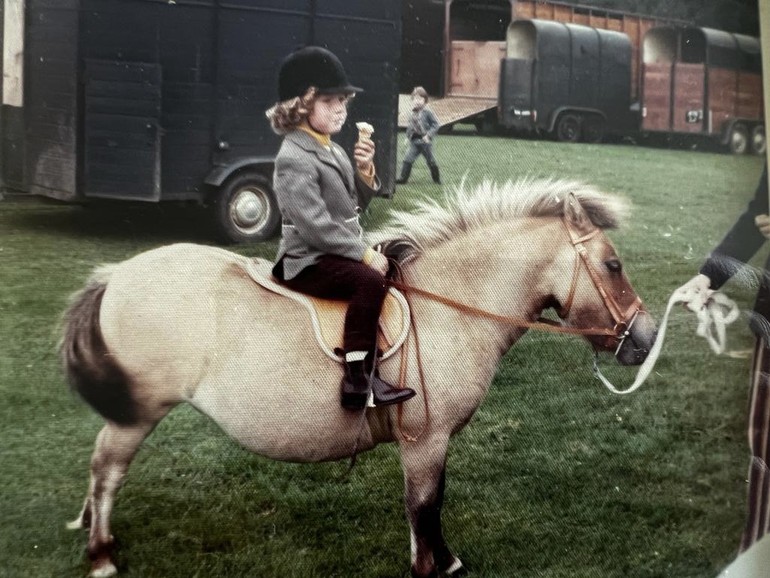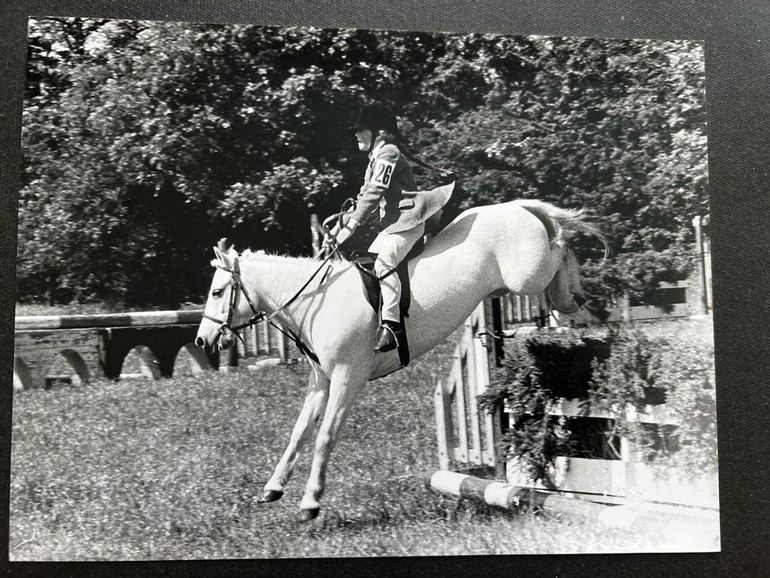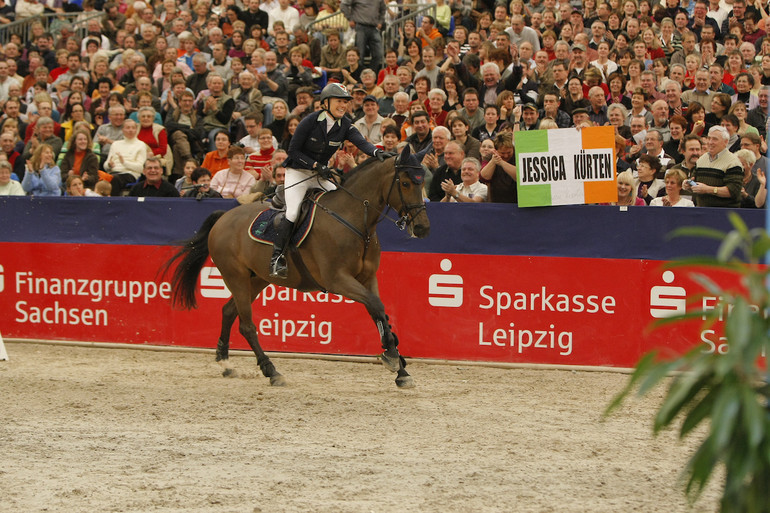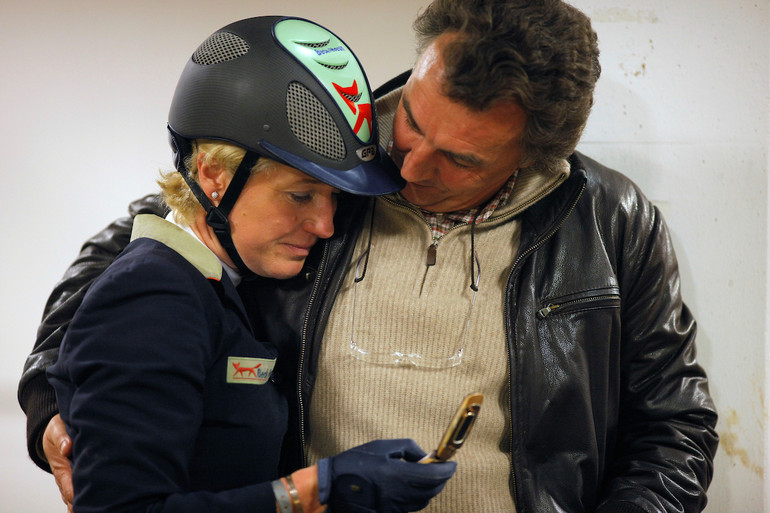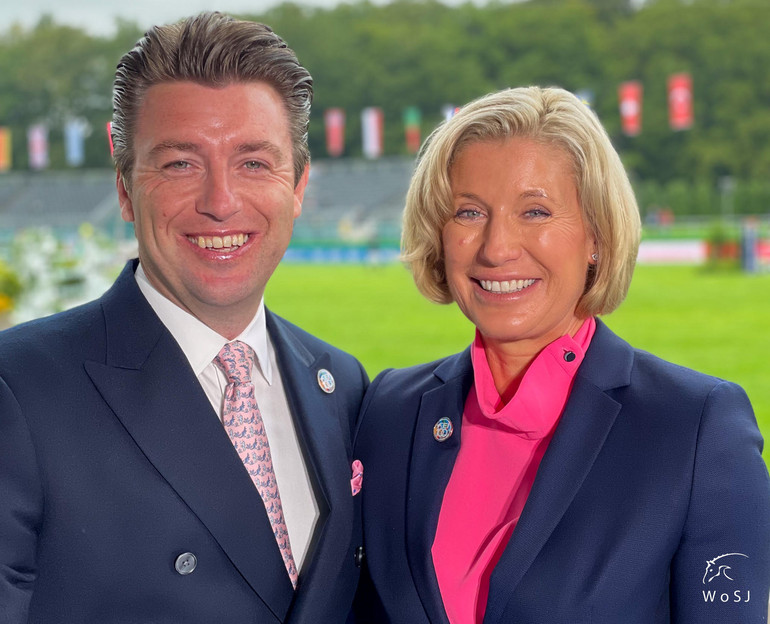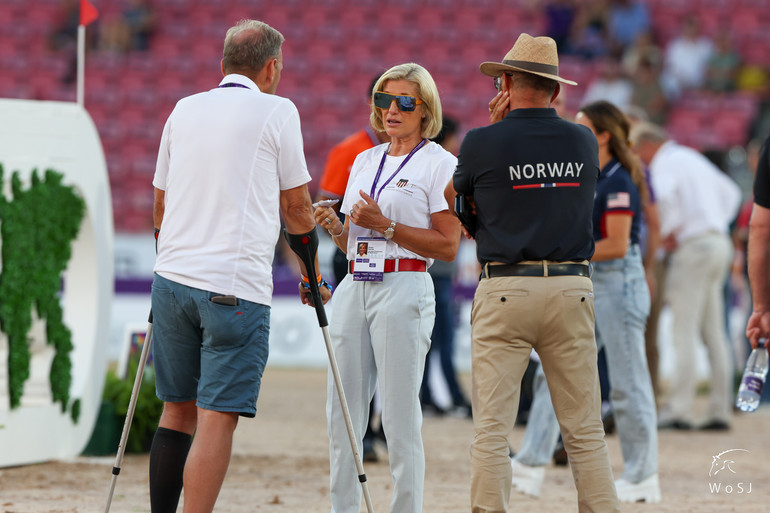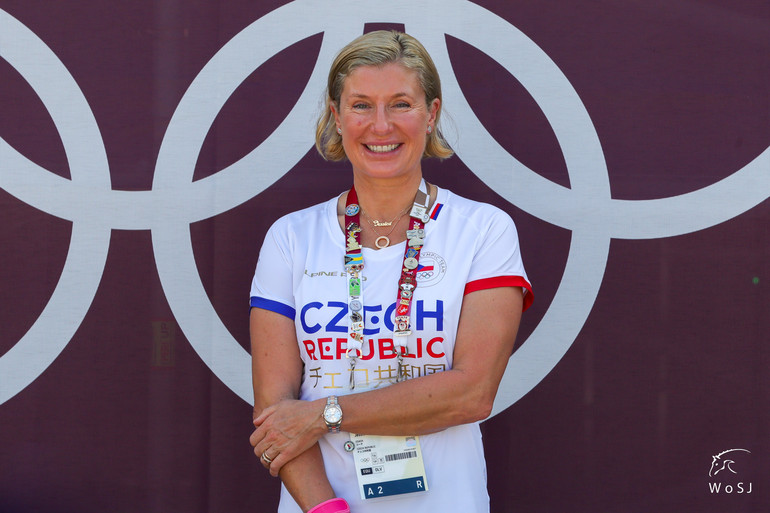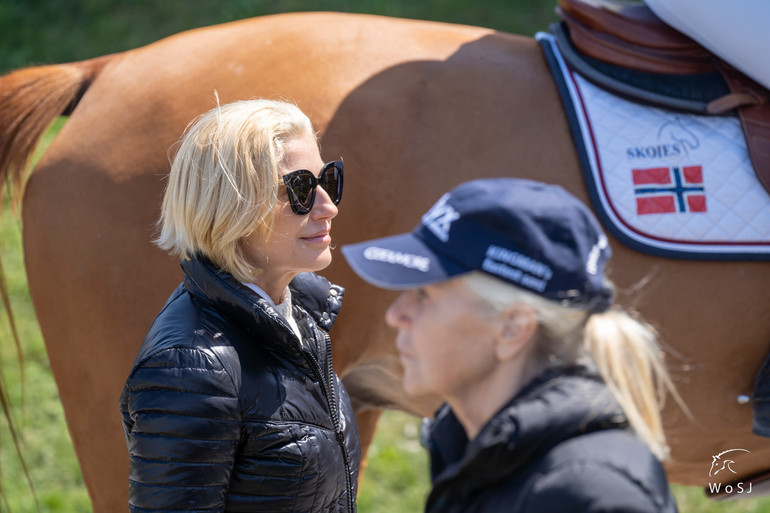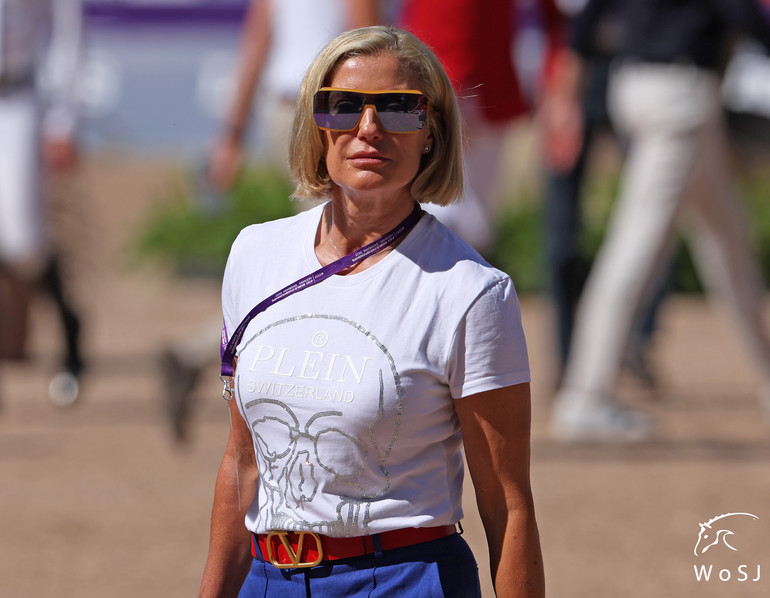 Jessica Kürten has transitioned from an active international competitor to a sought-after trainer, and in an attempt to share her knowledge she has taken on other unexpected roles too, such as being a much-loved commentator on FEI TV, as well as more recently being appointed Chair of the FEI Athletes’ Committee. Photo © Jenny Abrahamsson for World of Showjumping.
Jessica Kürten has transitioned from an active international competitor to a sought-after trainer, and in an attempt to share her knowledge she has taken on other unexpected roles too, such as being a much-loved commentator on FEI TV, as well as more recently being appointed Chair of the FEI Athletes’ Committee. Photo © Jenny Abrahamsson for World of Showjumping.
Text © World of Showjumping
“It is not about me and my sporting career anymore; now it is about my students and their horses – and my position is to use all my knowledge, experience and passion to help others in the sport,” Ireland’s Jessica Kürten tells World of Showjumping.
“Working with horses is something where you need to gain experience and you never stop learning,” Jessica says. “Horses do not speak, so it is a continuous process of watching, listening, understanding and feeling – why do they react in this way, what am I doing right and what can I do better? There is no written law as to how to communicate with horses – and I think there are more and more people who are hungry for knowledge.”
Kürten, a two-time Olympian, a European team champion, as well as a winner of the 2008 Global Champions Tour Final and one of only two female riders to ever have won the IJRC Top 10 Final – back in 2007 – was for years a mainstay on the Irish team. However, over the past decade, Kürten has transitioned from an active international competitor to a sought-after trainer – and, in an attempt to share her knowledge, she has taken on other unexpected roles too, such as being a much-loved commentator on FEI TV, as well as more recently being appointed Chair of the FEI Athletes’ Committee.
“If I could communicate only one word to the equestrian community, it would be ‘patience’. We all need it. Sometimes patience is painful, but it can pay off in the long run,” Jessica says.
You could say that Jessica was born to it; her mother went hunting when she was eight months pregnant, so Jessica was jumping before she was even born. “My first memories are with a donkey,” Jessica recalls. “My parents Rosemary and George had a lovely old donkey and what I did was take him from the stable to the garden, where I had a bucket, and I would get on the donkey from the bucket and then the donkey would walk back to the stable – and apparently, we did this all day.”
Growing up in Northern Ireland, we had a large pony club community – which I think is a great thing for kids
The decision to take riding seriously was one that Jessica made when she was twelve – and she still remembers the conversation. “My brother and I did a lot of pony club, hunter, working hunter and jumping classes, we did really everything,” she tells. “Growing up in Northern Ireland, we had a large pony club community – which I think is a great thing for kids. When I was I twelve, my father asked if we wanted to take riding seriously, and while my brother said no, I said yes. My brother Marcus was then too old to his 1.38m ponies, and I was to take them on and dad thought we should sell my show pony – but mum and I had another plan. We kept all three and for those two years that I was in that age group, we had a brilliant time. I had so much fun with these ponies.”
A rider has to be as good as the horse
One of the most memorable moments Jessica has from early on in her career, is not one of winning but rather falling off. “When I was in juniors, I had two horses; one racehorse and one big footed Irish horse that my dad had bought,” Jessica recalls. “I had been teaching this big horse to turn very sharp, because I got the chance to ride at two international shows. The second international show at Navan, near Dublin, was with top riders – it was an important event for me and I had been training a lot. I remember riding to number one and unfortunately over that fence, my horse turned quicker than me and I fell off. It was terrible, because all the top riders were watching at the entrance of the arena. I was extremely embarrassed and by the time I got up and got out of the ring, my dad had already sold the horse. ‘If you can’t stay on, I don’t need to keep him,’ my dad told me and the horse went on to Italy. It is a memory that stuck with me, but in a very positive way; the rider has to be as good as the horse. My dad was a complete horseman, and he had a very strong principle of having respect for your horse, which I am so lucky to have learned early on.”
My dad was a complete horseman, and he had a very strong principle of having respect for your horse
“My list of other memorable moments is long and mixed, and there are many reasons as to why particular achievements were important,” Jessica continues. “When I think back, my first World Cup win in Millstreet, Ireland, stands out – and it was with my wonderful Diamond Exchange. My father had sold my horses when I was doing my A-levels because he wanted me to concentrate on school – he thought it was a good idea. He told me that if I got accepted to a university, he would buy me a horse again.”
“When I did that, my father already had a horse in mind; we went and tried this huge horse that was completely out of control, but the feeling on him was amazing,” Jessica tells of Diamond Exchange – the horse that put her on the international showjumping map. “I took him from a five-year-old up to top level, and I won my first World Cup in Millstreet with him. It was just amazing; we were staying in the truck with my parents, it was a family thing. To have a World Cup at Millstreet in Ireland was a huge thing, and at that stage we had only watched it on TV, and back then there was a Volvo-car for the winner. It was such a huge moment for me, for my parents and such a big moment for Ireland. I can remember everything to this day; every detail about the whole competition.”
Special bonds
Throughout her career, Jessica was lucky to have amazing horses as her partners, and both she and her husband Eckard created very emotional connections to them. “Obviously, the bond grows closer the more you do together,” Jessica tells. “It is when you go through these big ups and downs, that the connection gets closer. Basically, all my horses taught me lessons; they all seemed to demand an individual way of reaching them, I could not just go with one system. All my horses told me how they wanted to have it, and I was continuously adapting to each horse to find the key to be successful in sport – that was my goal. We spent the time to produce and improve our horses, we were always working to make them better, like any athlete would. That was always our goal in the stable; not to just take a horse at face value, but to find a way to work with them to make them better.”
All my horses taught me lessons; they all seemed to demand an individual way of reaching them
“There were so many things that each horse taught me, and I felt a strong connection to most of them,” Jessica tells. “For sure I could mention names, like Diamond Exchange, Paavo, Quibell, Libertina, Cosma, Myrtille, Bonita… VDL Arezzo, Harley – I loved the two of them to bits! Arezzo was one of the last horses I rode and giving him back was a really difficult day for me, there were many tears… It is a joy for me now, as we have bred from some of the stallions I rode, to work with their offspring and I laugh when I see their father’s traits in them. Such wonderful horses I was lucky to have under my saddle and many of them went way beyond expectations. Libertina is one that everyone probably remembers, and she was me – basically the two of us were one. We have unbelievably similar personalities; we are both ambitious, we don’t like to be put in a box, we like our freedom. I am a person who always likes to think forward, but when I take the time to think back, the memories from my career are really beautiful – and all because of our horses.”
What a horse gives me as a rider, that feeling – it is really difficult to put into words
“I think sometimes a horse and rider meet each other and they absolutely bond from the first second they meet,” Jessica continues. “Like with people; sometimes you meet someone, and there is a bond there – you just start talking and there is an understanding, and sometimes it is like this with horses. Other times, it takes time to understand why a horse is reacting the way it is but when you do figure it out, you can really bond. I love being with the horses on the ground, but my biggest connection comes from sitting on the back of a horse. What a horse gives me as a rider, that feeling – it is really difficult to put into words. I think it is one of the reasons you see people drawn to horses even from families that are not familiar with the sport: Sitting on a horse feels like entering another world. I was very shy when I was young – now I have learned not to be, but I used to say that as soon as I was on a horse, I felt complete. When you have a good relationship with a horse, when you get on them, you become a person you are not when you are on the ground – and that is so special. For me, the feeling sitting on a horse that I have a bond with, is that we are undefeatable, together.”
Life will take its path
The decision to stop riding in 2014 was a long process for the two-time Olympian and European team champion. “It started to be in our thoughts to move in a different direction,” Jessica explains. “My husband and I had been doing the sport very intensely on a high level for many years, having a lot of success and an awful lot of fun. I have to say we enjoyed every moment of it – the ups, the downs, everything – and it just started to be that we were getting a bit tired. However, it was a slow process and it took two years to really decide. I remember driving the truck back from the show in Paris and my husband was in the car in front of me. I rang him up and said: ‘this is the moment, let’s stop’. I must say the decision was made with no idea of what I was going to do afterwards. There, the support from my husband was amazing: He told me that if it took a year for me to know what I wanted to do, then we would take that time. He told me not to worry, that life will take its path – and that is exactly what happened.”
You have to be so egoistic with your time when you want to be at the very top
“When I stopped riding, I wanted to give myself a five-year period – I was 45 when I stopped, and I wanted to know by 50 where I stand. I wanted to take my time, because everything in this sport is a very slow process. It did not take two days for me to start training and at one stage I was training a lot; basically, I was just running between the car, the plane and changing the suitcase. After three years of running, I felt it needed to change; the concept had to be modified. Having less students and more time with their horses, having slowed down a bit, is a concept I am very happy with right now. There are lots of facets in training and I like to think that when I work with my people, we try to have a good flatwork grounding, good jumping understanding, a lot of respect for the horses – that is the number one – and great planning. I really like to be involved with the grooms and the horse owners as well, to look for the best way to manage each horse.”
When I stopped riding, to have that freedom that it was no longer about me – it felt like a relief
“When I was riding, I did train a bit, but I was very egoistic about my sport,” Jessica explains about her transition from riding to training. “I was lucky to have a team around me – led by my husband who managed me – who followed my egoistic attitude. We were a very strong team, but at the same time we had one goal and it was for me to succeed with my horses in the sport – and when you have that mindset, when you do everything for that, your days are really full. You have to be so egoistic with your time when you want to be at the very top that there isn’t really much room for training others. When I stopped riding, to have that freedom that it was no longer about me – it felt like a relief. Now it is about my students, their horses, and their place in the sport. Therefore, the transition for me was easy – and even enjoyable; I was able to have a free mind and not think about myself anymore. We are very happy to have been brave enough to take this step.”
A voice within the FEI
In November 2022, Jessica was appointed as the Chair of the FEI Athletes’ Committee, a committee which plays a vital role and provides a voice to the athletes’ community within the global FEI decision-making process. “This is all very new,” Jessica says about her role. “I was asked to take on this role at exactly the right moment, as I was in a phase in my life where it would work. The more that we can be there – close to the FEI – and bring the athletes’ voices to them, the better. Obviously, with this position, I have a very close contact to the FEI, and I must say that, until now, they have been keen to get information from me, to hear the athletes’ points of view and get feedback on whether they are on the right track or not. I feel like we have had a very open conversation. There are many important points that have come up and important things that need to be decided, and it is imperative for the athletes to have a voice within the executive board of the FEI.”
The majority of the riders are not getting involved, for various reasons
“The majority of the riders are not getting involved, for various reasons; they don’t want to rock the boat, they are too busy with their own thing, they have not thought about it, and, and, and… this makes it even more important that some do think about the future of our sport. The athletes’ chair is not about me, it is about the athletes’ voices within the FEI Executive Board and that means it is my job to communicate as much as possible to the FEI for the athletes. I am thankful when athletes have come to me and shared what they are dealing with; together we are stronger.”
Constructive conversation over complaining
“Complaining is a much-used word in our sport,” Jessica continues to speak about the riders’ involvement when it comes to politics. “I think people should really think twice before complaining; constructive discussion is always better. We have all been under pressure in this sport; under pressure to be successful, to make it all go around financially – we have all been there. However, you need to keep cool and look for the discussion rather than complain. Everyone has their reasons for doing things, and it is all about coming together. I was really impressed with the latest FEI Sports Forum when we had the discussion between show organizers, riders, owners, and other stakeholders. We all came together, sat down and I think that was the first step of trying to find solutions for various difficulties around costs, invitations, the ranking, etc.”
Complaining is a much-used word in our sport
“We should sometimes just take a breath and look back; the sport is now full of young people, and this is probably why others in my age group are all very keen to voice their opinions and experiences. We see the young people only looking at what is now, and forgetting the work already done to improve equestrian sports. Unfortunately, such a wide community as ours can only work with rules and regulations, and if we don’t have them in place, it would be wild west. These rules and regulations over the last years have really helped the sport, and you can only know that if you look back and see how it was before.”
We should sometimes just take a breath and look back
“The sport has always been wonderful, but look at the improvements; the size of the stables, the facilities that need to be available for grooms – and I know we are still working on that, but it has already come far – and we keep improving. The riding hat; we used to ride without a helmet in the warm-up not so long ago! There are so many issues that have been dealt with. I am witnessing a very different situation as to what I thought it would be with the FEI; a very open, constructive conversation. There are some smart people within the Executive Board – maybe not all from the equestrian world but in their own right, smart people – and they have ideas, they are concerned about the good of our sport. I am pleased to be able to take part in these talks and see that there are people who really want our sport to move forward. Yes, there are people who are not on the field as I would be and that is where I need to then step in during the meetings; I need to share the viewpoint of the athletes and make sure where we come from is understood.”
Commercial versus passion
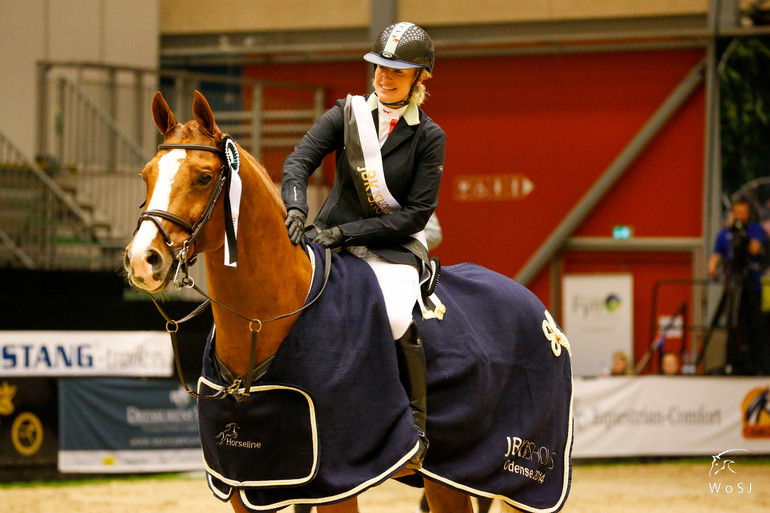 "I search for those who are curious to talk about the direction our sport is taking and what we should be actively doing in our community to push it in the right way, to allow the industry while at the same time save the sport for those – to whom I belong – who are passionate sports people," Jessica says. Photo © Jenny Abrahamsson for World of Showjumping.
"I search for those who are curious to talk about the direction our sport is taking and what we should be actively doing in our community to push it in the right way, to allow the industry while at the same time save the sport for those – to whom I belong – who are passionate sports people," Jessica says. Photo © Jenny Abrahamsson for World of Showjumping.
Moving forward, one of the biggest challenges the sport is facing is combining business with actual sport, Jessica points out. “We have the full-blooded sport riders, owners and organizers, and then we have the riders who are in the sport for commercial reasons – not really to compete but to take home a video. They are looking to use competition as a window to sell their product, their product being the horse. And then we have riders who want to win; win the 1.35, the 1.45m, the 1.50m and the Olympics – riders who are absolutely passionate about the sport and put the sport first.”
We have to keep our sport a sport
“Of course, our sport is very demanding financially – it has always been this way – but I think it is harder in this sense now than it has ever been,” Jessica says. “Therefore, riders have to sell horses to survive and that is why we do see top riders losing horses; you have to pay for your staff, pay your stable and put your kids to school – there are so many costs involved. I think this is our biggest challenge; having all this under one hat. Or, should we consider splitting things slightly? I am not sure – and there are not many people who are interested to have this discussion. However, I search for those who are curious to talk about the direction our sport is taking and what we should be actively doing in our community to push it in the right way, to allow the industry while at the same time save the sport for those – to whom I belong – who are passionate sports people. I understand the industry – we all sell horses – but the other side of me is saying that we have to keep our sport a sport; stay passionate, admire and look up to those who are wanting to win, at all levels.”
Set the boundaries from within
“We would not have welfare committees if it was all perfect,” Jessica moves on to speak about another challenge the sport is facing – the social license to operate. “I am a great believer that the boundaries should be set from us within and not from people from the outside, pushing them on us. However, in order to do that, we have to take responsibility – everyone has to do it, not only the top ten, not only the big owners, we ALL have to do it: Take responsibility for your horse and make sure that your horse has it good, that you are fair to your horse. Yes, we work with them as an athlete, but this can all be done in a fair, horse-friendly manner. Between ourselves, we should also communicate when we see things that maybe aren’t correct. Not every conversation is going to be an easy one, but we should interfere.”
Not every conversation is going to be an easy one, but we should interfere
“We need to look within ourselves as to where we stand in our relationship with our sport partner, our horse,” Jessica continues. “Basically, why do we do this sport with horses when we could all be doing something else? We do this because we love horses. Because when we were young, at some point we found our way to these incredible animals and we enjoy being with them – we enjoy grooming, cuddling, taking them out for grass and hacks. And if this is not the case, if you only want to sit on a horse and have a lesson, then maybe you should take a look in the mirror and ask if this is really the right sport for you?”
If you only want to sit on a horse and have a lesson, then maybe you should take a look in the mirror and ask if this is really the right sport for you
“This is not cycling, not tennis, not golf – instead of a bicycle or a racket, our partner in this sport is a living being,” Jessica says. “And when you have a partner like that, you have to care about their wellbeing, their health. If you want your horse to perform, they have to be fit, healthy and happy, and they need us to look after them. Yes, the grooms are there for the horses and are doing a great job, but the riders have to be interested in their horses and be involved as well. There should be a play between the groom and the rider, even when the rider might be very young. I think every kid should know how to feed, brush, tack up, and take their horse out to the paddock themselves. These things are part of the education young people in our sport should get. You won’t know how to do it right if no one tells you and teaches you! We have to go back to the very beginning and that is where these skills should be taught.”
We can achieve real change
“A lesson for us all is to not take ourselves too seriously,” Jessica continues. “There are so many of us in the sport, doing the same thing. We should not take our life with horses for granted, and keep our togetherness with these amazing animals as the number one priority. As long as we keep our respect and love for the horse and the fact that the horse is a 50% partner with us as our foundation, we will be able to make the boundaries for our sport ourselves and they will not be pushed upon us from the outside. That is my message for everyone in the sport, whether you are an amateur, horse dealer or top rider; we make the boundaries ourselves. And as a sport, we have to touch the imagination of the wider public as well and we need to keep ourselves exciting.”
We make the boundaries ourselves
Seeing beautiful horse-and-rider communication and a beautiful round in good rhythm is what Jessica herself enjoys the most. “I love to watch a really good jump-off, and myself I loved to ride a fast jump-off,” she says. “I am a passionate competitor and when I was in the ring, I wanted to win and I love seeing that mentality in other riders. A good Nations Cup – there isn’t anything much better. It is an amazing feeling to compete together as a team, you go into this world where you just wish that your colleagues are better than you. To win, it takes a team that has melted together and become one – it’s a phenomenon which can often be seen as an example with the Dutch team. For me, they have been one of the best teams in the world to show how they do it for each other: They always seem to be together, wanting the other one to be better; they are very good in coming together and making it work. This is essential in team competitions and what makes team competition so beautiful – and so important for our sport. And this team spirit is something I wish we had more of.”
We should keep our togetherness with these amazing animals as the number one priority
“With the Nations Cups, Grand Slam-shows and Globals, we have so many different top events in our sport that riders can aim for; there is enough room for everybody and we have to wake up to this,” Jessica says. “We shouldn’t be too aggressive against each other, but instead, embrace what we have and be happy that we have it. I believe everyone should pick their place and let others do the same, without pointing fingers. As a community, we need this strength of competition we have right now; we need these sponsorships to allow enough room for our horses and riders to compete at top level.”
“Nobody is perfect, not one of us – and that is good, that means we are not robots,” Jessica concludes. “If everyone closely involved in equestrian sport would just look in the mirror before going to bed, and think: ‘Am I doing the best for my horse, and is my position in the sport a passionate one?’ – take this thought to bed and sleep on it. The beauty of our sport is our connection with a horse, an ambition to win together – you can only win in this sport when a horse is your true partner, when you come from a place of extreme love of the horse.”
21.6.2023 No reproduction of any of the content in this article will be accepted without a written permission, all rights reserved © World of Showjumping.com. If copyright violations occur, a penalty fee will apply.



